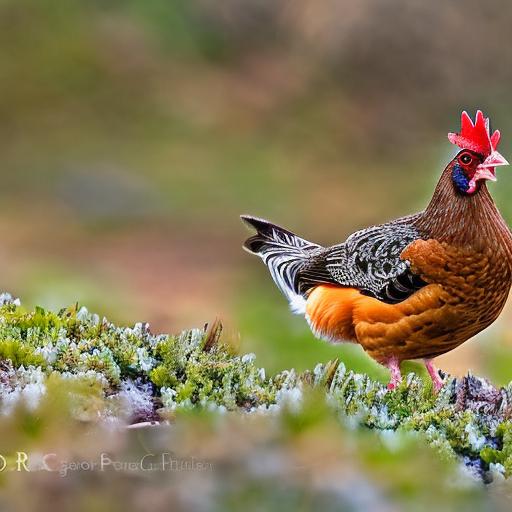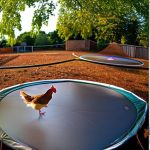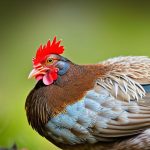Keeping chickens in winter can be a rewarding and enjoyable experience. Not only do chickens continue to lay eggs throughout the colder months, but they also provide natural pest control and fertilizer for your garden. However, it is important to properly prepare and care for your chickens during this time to ensure their health and well-being.
Key Takeaways
- Keeping chickens outside in winter requires preparation and understanding of their cold tolerance.
- Insulating your chicken coop and providing adequate ventilation are crucial for keeping chickens warm and healthy.
- Choosing the right breeds for winter and feeding them properly can also help with their survival.
- Providing water and protecting chickens from predators are important tasks during winter.
- Common winter health issues for chickens can be prevented with proper care and attention.
Understanding the Cold Tolerance of Chickens
Chickens are surprisingly resilient when it comes to cold temperatures. They have a natural ability to regulate their body temperature and keep warm. Chickens have feathers that act as insulation, trapping warm air close to their bodies. They also have a higher metabolic rate, which generates heat.
However, there are factors that can affect a chicken’s ability to withstand the cold. The age of the chicken plays a role, as younger chickens are less able to tolerate extreme temperatures. The breed of the chicken also matters, as some breeds are more cold-hardy than others. Additionally, the overall health and condition of the chicken can impact its ability to handle the cold.
Preparing Your Chicken Coop for Winter
Before winter arrives, it is important to thoroughly clean and disinfect your chicken coop. This helps prevent the spread of disease and parasites. Remove all bedding and debris, scrub the surfaces with a mild detergent, and rinse thoroughly. Allow the coop to dry completely before adding fresh bedding.
Next, check for any drafts or damage in the coop. Cold air can seep in through cracks or gaps, making it difficult for chickens to stay warm. Seal any openings with caulk or weatherstripping. Inspect the roof for leaks and repair any damage.
To provide insulation and warmth, add bedding to the coop. Straw or wood shavings work well as bedding material. Layer it thickly on the floor of the coop and in nesting boxes. This helps trap heat and provides a cozy environment for the chickens.
Insulating Your Chicken Coop for Winter
Insulating your chicken coop is crucial for keeping your chickens warm during the winter months. There are several types of insulation materials you can use, such as foam board, fiberglass insulation, or reflective insulation. Choose a material that is safe for chickens and easy to install.
To properly insulate the coop, start by insulating the walls. Cut the insulation material to fit the dimensions of the walls and attach it securely. Pay special attention to corners and edges, as these areas are prone to drafts. Insulate the ceiling and roof as well, as heat can escape through these areas.
While insulation is important, it is equally important to provide proper ventilation in the coop. Ventilation helps remove moisture and ammonia from the air, which can lead to respiratory issues for the chickens. Install vents near the top of the coop to allow fresh air to circulate without causing drafts.
Providing Adequate Ventilation for Your Chickens
While it may seem counterintuitive, providing adequate ventilation in your chicken coop is essential during winter. Fresh air flow helps remove moisture and ammonia from the coop, which can lead to respiratory issues for the chickens.
To provide ventilation without causing drafts, install vents near the top of the coop. These vents should be adjustable, allowing you to control the amount of airflow. It is important to keep them open at all times, even during cold weather.
Signs of poor ventilation include a strong ammonia smell, excessive condensation on windows or walls, and respiratory issues in your chickens. If you notice any of these signs, it is important to address the ventilation issue immediately.
Choosing the Right Breeds for Winter

When choosing chickens for winter climates, it is important to select cold-hardy breeds. These breeds have been bred specifically to withstand colder temperatures and harsh weather conditions. Some popular cold-hardy breeds include Rhode Island Reds, Plymouth Rocks, and Wyandottes.
When selecting a breed, look for characteristics that make them well-suited for winter. These include a small comb and wattles, as these are less prone to frostbite. Feathers that are dense and close-fitting also provide better insulation. Additionally, breeds that are known for their foraging abilities will be better able to find food during the winter months.
Feeding Your Chickens in Winter
Feeding your chickens a balanced diet is important year-round, but it becomes even more crucial during the winter months. Adjust their diet to provide extra protein and nutrients to help them stay healthy and maintain their body temperature.
Include high-quality protein sources in their diet, such as mealworms or black soldier fly larvae. These can be purchased or raised at home. Supplement their diet with fresh fruits and vegetables, as well as grains and seeds. Avoid feeding them too many treats, as this can lead to nutritional imbalances.
In freezing temperatures, it is important to take extra precautions when feeding your chickens. Make sure their food and water are not frozen. Provide warm water to prevent dehydration. Consider using heated waterers or adding warm water to their existing water source.
Providing Water for Your Chickens in Winter
Providing water for your chickens in winter can be challenging, as it tends to freeze quickly. However, it is crucial to ensure that your chickens have access to fresh water at all times.
To prevent water from freezing, consider using heated waterers specifically designed for poultry. These keep the water at a temperature that prevents freezing. Alternatively, you can use heated pet bowls or add a small amount of salt to the water to lower its freezing point.
If you are unable to provide unfrozen water, consider offering alternative water sources such as warm oatmeal or vegetable scraps with high moisture content. These can help keep your chickens hydrated during the winter months.
Protecting Your Chickens from Predators in Winter
Predators pose an increased risk to chickens during the winter months, as food becomes scarcer and they are more desperate for a meal. It is important to take extra precautions to protect your chickens from predators during this time.
Secure the coop and run with sturdy fencing that is buried at least a foot into the ground to prevent predators from digging under. Install hardware cloth over windows and vents to prevent entry. Make sure all doors and latches are secure and cannot be easily opened by predators.
Consider using motion-activated lights or alarms to deter predators. These can startle them and discourage them from approaching the coop. Additionally, remove any potential hiding spots near the coop, such as tall grass or brush piles.
Common Winter Health Issues for Chickens and How to Prevent Them
Winter can bring about certain health issues for chickens, but with proper care and prevention, these can be minimized. Some common winter health issues include frostbite, respiratory infections, and vitamin deficiencies.
Frostbite occurs when chickens are exposed to extreme cold temperatures for prolonged periods of time. To prevent frostbite, make sure the coop is well-insulated and free from drafts. Avoid using heat lamps, as they can be a fire hazard. If you notice signs of frostbite, such as blackened or swollen combs or wattles, consult a veterinarian for treatment options.
Respiratory infections are more common in winter due to poor ventilation and increased moisture in the coop. To prevent respiratory infections, ensure proper ventilation in the coop and keep bedding clean and dry. Avoid overcrowding, as this can increase the risk of disease transmission.
Vitamin deficiencies can occur in winter when fresh greens are scarce. Supplement your chickens’ diet with vitamin-rich foods such as leafy greens or provide them with a poultry vitamin supplement. Consult a veterinarian for specific recommendations based on your chickens’ needs.
Keeping chickens outside in winter can be a rewarding and enjoyable experience. By properly preparing and caring for your chickens, you can ensure their health and well-being during the colder months. From cleaning and insulating the coop to providing adequate ventilation and nutrition, there are several steps you can take to keep your chickens happy and healthy in winter. With the right breeds, proper feeding and watering, and protection from predators, you can enjoy the benefits of keeping chickens year-round.
If you’re wondering whether you can keep chickens outside in the winter, you may find this article on Poultry Wizard quite helpful. It discusses various aspects of keeping chickens in colder climates, including tips on insulating your chicken coop and providing adequate heating. For more information on creating a suitable environment for your feathered friends during the winter months, check out their article on heaters for a chicken coop. Additionally, if you’re interested in learning about the importance of a well-designed floor for your chicken coop, Poultry Wizard has an informative article on the floor of a chicken coop that you might find useful.
FAQs
Can chickens survive outside in the winter?
Yes, chickens can survive outside in the winter as long as they have proper shelter, food, and water.
What kind of shelter do chickens need in the winter?
Chickens need a dry and draft-free coop that is well-insulated and has good ventilation. The coop should also have a roosting area and nesting boxes.
What kind of bedding should be used in the coop during winter?
Straw or pine shavings are good bedding options for chickens in the winter. The bedding should be kept dry and changed regularly.
What kind of food should be given to chickens in the winter?
Chickens need a balanced diet that includes grains, protein, and vitamins. In the winter, they may need more protein to help keep them warm. Supplemental heat sources are not recommended.
How often should chickens be checked on in the winter?
Chickens should be checked on daily in the winter to ensure they have access to food and water and that their coop is clean and dry. Any signs of illness or injury should be addressed immediately.
What are some common health issues that chickens may face in the winter?
Chickens may be more susceptible to respiratory infections and frostbite in the winter. It is important to keep their coop clean and dry and to provide them with proper shelter and bedding.
Meet Walter, the feathered-friend fanatic of Florida! Nestled in the sunshine state, Walter struts through life with his feathered companions, clucking his way to happiness. With a coop that’s fancier than a five-star hotel, he’s the Don Juan of the chicken world. When he’s not teaching his hens to do the cha-cha, you’ll find him in a heated debate with his prized rooster, Sir Clucks-a-Lot. Walter’s poultry passion is no yolk; he’s the sunny-side-up guy you never knew you needed in your flock of friends!







